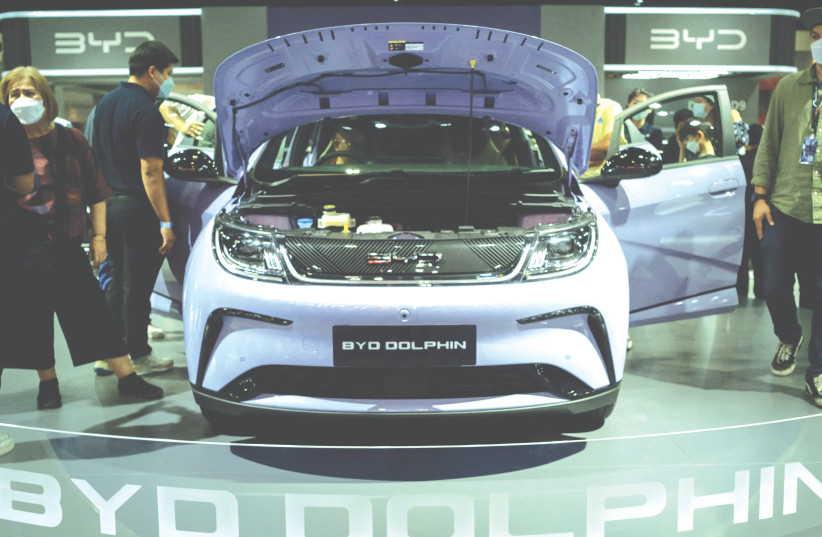The Israeli establishment has yet to react with actions to the dramatic statement made by US President Joe Biden last week, according to which Chinese electric cars pose a danger to American national security.
Because of the data collection they carry out on users and the environment, Biden ordered the US Secretary of Commerce to examine the matter and to protect the US from Chinese industry.
The statement was seen by many as an attempt by the president to protect the American auto industry from competition from the rising Chinese industry at a time when Biden is struggling to win the support of its workers in the upcoming election.
Chinese brands now sell almost no vehicles in the US, except for BYD, which has a small factory for the production of electric yellow school buses for transporting students, which began about a decade ago, before the rise of tensions between China and the US.
BYD is also in talks to build a factory for its electric vehicles in Mexico, after already starting to build similar factories in Thailand, Brazil, and Hungary, as part of a global expansion.

Mexico is a partner in a trade agreement with the US and Canada, which will allow the Chinese to produce cars there using cheap labor and to export electric cars from it to the US, and to bypass the administration's opposition to establishing a Chinese factory in US territory.
The Chinese company, Geely, which knows the American sensitivity to Made in China products, signed an agreement with Renault's subsidiary, Samsung, to produce the Polestar electric models in its factories in South Korea, in order to export them from there to North America.
Do Chinese cars really collect important information and transfer it to servers in China?
Already in 2018, a report by AP warned that Chinese electric cars are collecting information about their location on government orders, which is available to government officials.
The report then referred to cars being sold in China itself before significant exports of Chinese electric cars began but noted that this was not always done with the knowledge of the car owners. Officially, the information is used by the Chinese government to identify traffic problems.
Senior officials in the local cyber industry explain that modern cars, especially electric ones, don't just collect information about their location. "A modern car contains cameras and microphones, is connected to our mobile phone and can read messages. It can also interface with quite a few mobile apps. What is collected, and what information is transmitted from the car, depends on the manufacturer's settings, which the drivers do not always check."
In Israel, Walla Car revealed that the Chinese Zeekr, which was recently launched in Israel, signs the purchasers to a purchase agreement that states, among other things, that "systems installed in the vehicle which, among other things, may monitor, save and transmit to the manufacturer's systems various data, including personal information about the vehicle, the vehicle owner, and the users or the passengers in the vehicle, such as, but not limited to, the chassis number of the vehicle, data on the condition of the vehicle, the performance of the vehicle, the use of the vehicle, the behavior of driving the vehicle, the location of the vehicle, the speed of travel, charging data, maintenance, breakdowns, and repairs, as well as voice recognition and face recognition."
The agreement even explicitly states: "The data may be transferred by the manufacturer to third parties, including the importer, and they will be allowed to use the data, in accordance with the manufacturer's privacy policy for vehicle connectivity and subject to the law."
An official at Zeekr Israel said at the time, in a conversation with Walla Car, that "The Chinese government is not included in the privacy policy that deals with third parties, and the servers that store the Israeli users' data are not located in China, but in Frankfurt, Germany. The Chinese government has no right to access users' personal information. The user's personal information is protected by personal information protection laws around the world, including in China. "Ziker is committed to Europe's strict privacy regulations."
The information-gathering capabilities also have security implications. The Chinese themselves have blocked the entry of Tesla models sold by them to security facilities because they are also equipped with cameras to collect information and broadcast it outside.
IDF using hundreds of Chinese vehicles
In Israel, the IDF leased hundreds of Chinese Chery Tigo 8 vehicles as attached vehicles for officers with large families. The Chinese BYD Atto 3 and MG Maravel R won the government vehicle manager's tender, which is also intended for police vehicles.
A military source claimed in a conversation with Walla Car that the IDF made sure that the vehicles it leased were unable to transmit information to outside parties.
The source refused to elaborate, but Walla learned that it was the cancellation of the Call E system that calls an external hotline in the event of an accident and can transmit information about the vehicle's location to it for the benefit of rescue forces and its cancellation is intended to block the vehicle's ability to transmit information.
Despite this, the IDF decided that the Chinese vehicles would not enter bases defined as sensitive, or sensitive parts of other bases, a restriction that is also maintained during Operation Iron Swords.
The Shin Bet (Israel Security Agency), which is responsible for preventing espionage by foreign bodies in Israel, refused to answer questions on the subject.
But perhaps the answer lies in the fact that, unlike the IDF, the organization's vehicle fleet does not have Chinese cars, which are becoming more and more common in Israel.
And the police? The Finance Ministry, where the director of government vehicles operates, stated that "as of today, no instructions have been received from the authorities in the country regarding the use of Chinese vehicles. Whenever such instructions are received, the vehicle administration will follow them."
